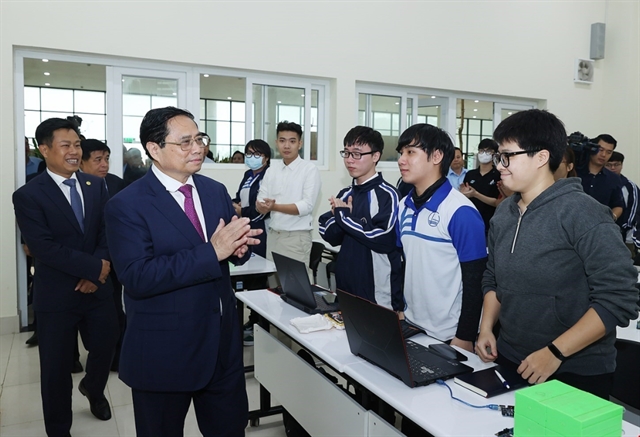 Society
Society


|
| Prime Minister Phạm Minh Chính meets students at the Vietnam National University (VNU) in Hòa Lạc, Hà Nội on Friday. VNA/VNS Photo |
HÀ NỘI – Prime Minister Phạm Minh Chính emphasised the need to increase investment in the development of human resources for the research of semiconductor integrated circuit technology in Việt Nam.
He was speaking during a visit to the Hoà Lạc High Tech Park in Hà Nội, where he met with leaders from the Vietnam National University (VNU).
The Prime Minister stressed that the VNU should prioritise cooperation with both domestic and foreign enterprises in order to train, research, transfer and commercialise products related to this technology.
During the meeting, VNU leaders reported on the training of talent and high-quality human resources and research and training on integrated circuits being carried out at the university.
The VNU has made significant progress in achieving these goals since relocating its headquarters to Hòa Lạc in Thạch Thất District in May 2022. The university has adopted a multidisciplinary model with nine universities, five research institutes, and 22 affiliated training and research centres.
The total number of officers and employees is now 4,667, with 2,251 permanent lecturers. Among them, there are 62 professors and 414 associate professors, accounting for 20 per cent of total. A total of 66 per cent of officers and employees have gained doctorate degrees.
VNU has established an international academic culture, with the number of international articles increasing year by year from 400 articles in 2012 to about 1,600 articles in 2022.
The university is expanding its facilities and equipment to meet the training scale of 6,000 students and is aiming to serve 25,000 by 2025.
VNU has been a pioneer in the semiconductor integrated circuit design industry, providing nearly 1,200 students with expertise related to IC design to the labour market each year.
So far, more than 12,000 students have graduated in this field from the university.
It has promoted international cooperation to improve the quality of training and scientific research and enhanced the training of high-quality human resources for a number of countries in the region and around the world.
PM Chính praised VNU’s great efforts and determination in gaining these achievements.
He encouraged VNU to continue building and strengthening a united, strong, and innovating scientific staff in a bid to build a modern, prestigious, and reputable training and scientific research institution.
Chính expressed his desire for the university to become a hub for leading scientists in Việt Nam and in the world, and emphasised its role in nurturing outstanding intellectuals, successful business leaders, and prominent individuals for the country.
He also emphasised the need for comprehensive development, with a focus on a number of areas of basic and specialised science in line with the trend of the world.
Chính suggested that VNU closely connect training with scientific research, and develop natural sciences and social sciences, basic sciences, and applied sciences at the same time. This would contribute to the development of science and technology, perfect the ideological foundation, and provide scientific and reliable grounds for the Party and State in plans for the country’s socio-economic development.
He noted the importance of promoting start-ups and the commercialisation of scientific research results and products based on strengthening public-private cooperation and promoting digital transformation.
VNU should focus on developing a team of high-quality, regional, and international-level lecturers and researchers. There should be a mechanism to encourage students to study basic sciences, and specific and rare industries to serve the rapid and sustainable development of the country.
He requested the construction of the VNU campus in the Hoà Lạc area should be sped up, establishing a green, modern, and intelligent university campus that matches the region’s 5-in-1 model.

|
| PM Chính delivers a speech at Hà Nội-based FPT University. VNA/VNS Photo |
On the same day, PM Chính visited Hà Nội-based FPT University.
FPT Corporation Chairman Trương Gia Bình said with a population of 100 million in the golden population period, Việt Nam has the potential to become a global technology education and training hub.
He also expressed his belief that Việt Nam has the potential to rank among the top ten countries in the world in terms of information technology, agriculture, and tourism.
Nguyễn Vinh Quang, director of FPT Semiconductor, a unit of FPT, said the unit managed to design and manufacture three lines of source chips and has already secured a contract to supply 25 million chips to partners in 2024 and 2025.
FPT has also received an order for two million chips from a Japanese partner. The corporation plans to launch seven new chip lines this year and will next year design and manufacture IoT platform chips for smart device applications, IoT for agriculture, forestry, and seafood.
Quang proposed that the Government create favourable conditions to develop human resources in Việt Nam, particularly in the area of semiconductor chip design.
Việt Nam needs to establish a national centre to support the semiconductor industry and to attract large enterprises to invest in building factories and training personnel for this industry, he said.
PM Chính acknowledged FPT's contributions to building an independent and self-reliant economy associated with active and proactive international integration.
He assigned various ministries to strengthen State management, improve the quality of education and training, develop digital universities, promote scientific research, and increase general labour productivity.
The Ministry of Labour, Invalids and Social Affairs was assigned to manage vocational training, pay special attention to vocational skills, and develop a healthy, sustainable, integrated, and efficient labour market. – VNS




